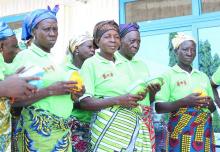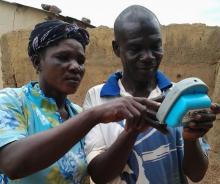Teaching technical information to people who are mostly not literate can pose serious challenges. But if use of books isn’t helpful, Talking Books can get the message across.
The Greater Rural Opportunities for Women (GROW) project of Mennonite Economic Development Associates (MEDA) has made wide use of Talking Books through a partnership with Literacy Bridge, a Ghanaian non-governmental agency.
More than a thousand lead farmers—producers trained to share information and best practices with their peers—who are part of the GROW project use the technology. Talking Books help them share critical information related to agriculture, gender, nutrition, finance, buyers and suppliers, and other matters that affect the farmers they work with.
The Talking Book is an inexpensive mass-communications technology that promotes learning opportunities for women, men and children. Literacy Bridge provides the book to the women in the GROW program at no cost. Users buy the AA batteries needed to power the device, which could also be run by electricity in areas where that is available.
Last year, MEDA’s efforts to record timely and valuable advice on pest control saved farmers from having crops in the upper west region of Ghana being ravaged by an infestation of fall army worm. Early warnings helped farmers launch large-scale efforts to rid their fields of the worms.
“The Talking Book is much better than the radio because it deals with issues that affect our daily lives,” says Hillia Kazie of Kohuo, which is in the upper west region of northern Ghana. “The radio sometimes talks about things that are not useful to us, but we cannot ask the people inside there to switch to a different topic. . . . With the Talking Book, we decide what to listen to and when to do that. All the topics are useful.”
Literacy rates among women in Ghana are much lower than the proportion of men who can read and write, particularly in rural areas. Talking Books are a powerful extension tool because multiple messages are recorded in the appropriate local dialect and uploaded to the device for people to listen to and use.
Messages are updated quarterly as necessary on emergency issues such as disease outbreaks or pest problems. MEDA technical staff put together the messages and have Learning Bridge translate them into seven local languages.
All MEDA groups in the GROW project have a Talking Book device. They listen to information during their village savings and loan association meetings and also at the individual or household level, as the device can be shared among group members. If members miss a meeting or training session, they can listen to the Talking Book and catch up with their fellow farmers later.
Abina Bagiro is a 64-year-old lead farmer with the Neeweri group, which means “where is better.” She has found that her participation in the GROW program and use of the Talking Book have led to positive changes in attitudes around gender roles in her 14-member household, which includes five children and her husband.
Before the project started, she was responsible for cooking, fetching water and caring for household needs, while her husband Fatawu Bagiro decided which crops to plant, took care of the farming and household decision-making. Now she and her husband work together to achieve the common goal of improving living standards for their household.
“The Talking Book teaches me how to take care of my children and the roles of a man, a woman and children,” she says.
Household members now share responsibilities equally. Males pitch in with cooking, washing utensils and fetching water, while women help with farming and caring for livestock.
Fatawu realizes that he must rely more on his wife to care for him. He is now supportive of her choice of land to farm and gives free access to the farm, which allows the family to plan their agricultural activities together.
“In my household there is nothing like this work is mine and the other is not mine,” Abina says proudly.
Her two married sons have also heard the Talking Book messages about gender and spouse relationships and have happy and peaceful relationships with their wives and families. Those who shirk their responsibilities, or start to slip back into an old way of thinking, are referred back to the Talking Book to listen to the message again.
A lead farmer from Kohuo says the Talking Book messages have even helped to expand her family. “My in-law has become pregnant through the unification between [her] and her husband through the consistent learning to the gender messages,” she says. “It is my hope that, when she delivers successfully, I will even name the baby after MEDA or PRUDA [Partnerships for Rural Development Action, one of MEDA’s local partners].”
This article originally appeared in the July, 2018 edition of The Marketplace magazine.

MEDA distributes Talking Book devices to share information related to agriculture, gender, nutrition, finance, buyers and suppliers, and other matters that affect Ghanaian farmers. (Photo by Christian Kuder)




Add new comment
Canadian Mennonite invites comments and encourages constructive discussion about our content. Actual full names (first and last) are required. Comments are moderated and may be edited. They will not appear online until approved and will be posted during business hours. Some comments may be reproduced in print.